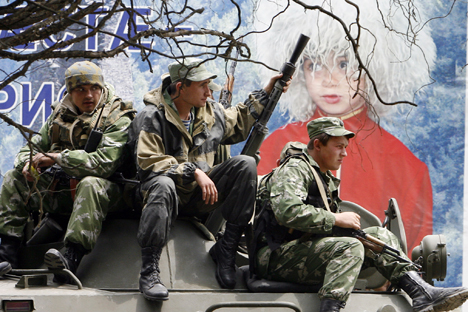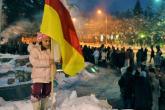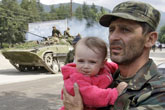South Ossetia, five years after the war

The residents of Tskhinvali say that the main achievement of the last five years was the ability to sleep peacefully, without fear of another war breaking out. Source: Reuters
Five years ago, war began in South Ossetia when Georgian President Mikhail Saakashvili ordered his army to invade the breakaway republic. The following day, Russia announced it was sending its troops into South Ossetia. These events are now called the ‘Five-Day War’, and were the official reason for recognition of the independence of South Ossetia and Abkhazia by the Russian Federation.
Five years later, Russian journalists tried to make sense of the events that gave rise to this independence of South Ossetia.
Five years after the war, if one looks at Tskhinvali from above, it seems that this is a new city with red-green inflorescent roofs. Having been brought into relative order, for people who come here for a day or two, the city centre presents a nice picture. However, at a closer glance, it becomes clear that the recovery process is still far from complete. Many residents have spent years in buildings ruined during the war, and some people still do not have normal living conditions.
Russian authorities repeatedly changed the order of federal funding for South Ossetia and reconstruction schemes. At first, these schemes involved many intermediaries, including the Ministry of Regional Development, and then the intermediaries left, but the reconstruction process was left unfinished. Locals are blaming the corrupt officials, who simply skimmed billions that were allocated for the rebuilding of the republic, and fled.
The leaders of South Ossetia label this public discontent as ingratitude. In an unofficial interview, one former official said that, “People refuse to see how much has really been done.” Soslan Dzhusoyev, advisor to the president of the republic, believes that, “The process of recovery, of course did not justify the hopes pinned on it, but those expectations were initially overstated – and people were expecting that everything would be quickly restored after the war.”
Today, most “government” spokespersons, in one way or another, are no longer concerned about external threats, but internal ones. Sergey Zasseyev, chairperson of the Committee on Youth Policy, said that while South Ossetia was at war against Georgia, the society was united. However now, that security is guaranteed by Russia and the external threat has disappeared, another threat has appeared – divisions in society. This, according to the young official, can be seen in the fact that the country has registered a “huge number of political parties”.
The young political scientist Alina Dzhioyeva has her own view of the events taking place – saying that the gap between the people and the government can certainly lead to the formation of an active civil society. “We will be holding parliamentary elections in one year, and already 15 political parties have been registered – people are trying to organize and then somehow influence the current political and economic processes,” she says. “I see in this a desire in the people to change something in their surroundings. Five years after August 2008, we are beginning to realize that we cannot expect others to do something for us – and even if they do, then we will not see any benefit from it for ourselves.”
Against the backdrop of a protracted reconstruction of the republic, the deafening public anger somewhat subsided once talk started of a possible entry of South Ossetia into the Russian Federation. Now, many officials are saying that the people will chose independence.
Society still perceives Russia as a country that has recognized the independence of South Ossetia and freed its people from the horror of war and uncertainty – and for this, its citizens consistently express gratitude to Russia. Residents of Tskhinvali, almost unanimously, say that the main achievement of the last five years was the ability to sleep peacefully, and not be afraid of another war breaking out.
However, sometimes one gets the feeling that in the minds of Tskhinvali residents, there are two Russias – one that saved them, recognized their republic and helped, and another Russia – which sent dishonest officials, who profiteered from war reconstruction.
“The recognition of our independence by Russia was important, first of all from the point of view of the moral-psychological factor,” says Irina Gagloyeva, director of the IR Media Center. “Russia has given us a chance for a future.” However, Gagloyeva believes it is too early to relax, as South Ossetia still faces many threats – it has not been recognized by most of the world, Georgia has not given up its hope of getting the republic back, and the social divisions, which we are seeing here today, are playing into the hands of “detractors.”
“Today, I see all the elements of national psychological depression – people do not believe in themselves, have no confidence in their society, their leaders, and their country,” Gagloyeva says. “Life goes on by inertia, with no activity. Perhaps this is due to the fact that the economy is not developing – we are seeing complete economic stagnation.”
Related:

Russia gives about 34 bln roubles of financial aid to South Ossetia since 2008
NATO disturbed by S.Ossetia border fences
Chief doctor held for selling newborn in South Russia - police
Officials in both South Ossetia and Moscow have promised that the republic’s economy will get a boost, and by the beginning of 2014, it will be possible to talk about new socio-economic development.
Meanwhile, relations between South Ossetia and Georgia remain extremely tense. On the South Ossetia side, they have been strengthening the border area for several months already. Georgia has complained loudly, saying that Russian border guards moved the boundary line deep into its territory. At the same time, in South Ossetia they call this process the demarcation of the border.
At the same time, many South Ossetia officials agree that, sooner or later, relations with Georgia, their closest neighbour, will have to be improved. David Sanakoyev is convinced that dialogue between Tbilisi and Tskhinvali can start only after Georgia “gives guarantees of non-aggression against South Ossetia, carries out a political and legal assessment of the actions of its leadership against the citizens of South Ossetia, and compensates for the damage caused to the country.”
According to Alla Dzhioyeva, today, in the absence of official relations between Tskhinvali and Tbilisi, relations are occurring at the level of ‘people’s diplomacy’. Tbilisi is geographically closer than Vladikavkaz, and in the winter, when the Trans-Caucasus Highway is fully covered by snow, the country gets cut off from Russia for a few days. “Seriously ill citizens of South Ossetia come to us with requests to send them for treatment to Tbilisi,” says Dzhioyeva. “I think that at the level of ‘people’s diplomacy,’ these relations will be developed – neither we nor the Georgians are going to disappear, and so, sooner or later, a common theme will be found.”
This story has been abridged from the original version, which can be read in Russian in Kommersant-Vlast.
All rights reserved by Rossiyskaya Gazeta.
Subscribe
to our newsletter!
Get the week's best stories straight to your inbox
